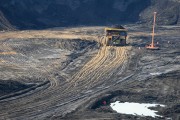This week, Alberta’s first new oilsands mining operation since 2013 could get the green light, as a joint review panel releases its report and recommendations after public hearings last year. Teck Resources’ proposed Frontier mine – a 293-square-kilometre, open-pit mine on the edge of Wood Buffalo National Park – could produce 260,000 barrels of heavy crude per day.
While adverse effects will surely be acknowledged, there’s a strong likelihood the joint panel will recommend the federal minister lend approval to the project. Without the right conditions in place, however, this oilsands operation, which has a four-decade life span, could come at a significant cost.
For 35 years, the Pembina Institute has worked with the oil and gas industry to improve environmental performance, helping to ensure project approvals come with conditions for cleaner air, less emissions, and commitments to minimize impacts on species at risk. Pembina has been involved in the Frontier mine regulatory process as a public interest intervenor since 2012.
Last fall, we participated in the joint review panel hearings and provided pragmatic recommendations to be met – including requirements that Teck Resources demonstrate how it will substantially reduce greenhouse gas emissions throughout the lifetime of the project, that it place funds in reserve now to cover the costs of clean-up later, and that biodiversity needs are met – before the project proceeds.
This March, Teck Resources worked with First Nations communities, the provincial government and other oilsands companies to address biodiversity concerns. This resulted in the creation of Kitaskino Nuwenëné Wildland Provincial Park, a new protected area that provides important habitat for caribou and other species at risk.
That’s good news, and addresses some of the concerns we (and others) raised about impacts to wildlife and biodiversity. Pressing concerns about greenhouse gas emissions and liability risks remain, with Albertans already potentially looking at billions of dollars in reclamation costs for oil and gas wells owned by companies lacking the capacity to cover the costs of clean-up.
The world has changed since Alberta’s last oilsands mine was approved. Oil is a key industry in Alberta, and will be for the foreseeable future. However, as lower-emitting options become more economically attractive, carbon-intensive operations like Teck Frontier will face stiff competition. A project of this magnitude would require decades of sustained high oil prices to make it economical while also profitable enough to cover the final $2.8 billion clean-up bill when operations cease at the end of its four-decade lifespan. As a condition of approval, Pembina asked that the operator be required to place the needed funds in reserve to cover the costs of clean-up now, not decades from now when the value of bitumen will likely have decreased even further.
In addition to questions of economic competitiveness and paying for the clean-up, the Frontier mine alone would contribute six megatonnes of carbon emissions annually in a province with a 100 Mt emissions cap. That may not sound like a lot, but Alberta is hovering at about 80 Mt in annual emissions, and already approved projects will push that number to 130 Mt, well past the legislated – but not enforced – limit.
To that end, we also asked that Teck demonstrate how it will reduce Frontier’s emissions by 50 per cent between 2026 and 2050 – consistent with Canada’s mid-century requirements – before the project is allowed to proceed.
Additionally, we asked the panel to ensure regulations are in place to credibly enforce the 100 Mt limit before another project puts a shovel in the ground. This cap not only helps manage oilsands emissions growth, it is key to keeping Alberta’s oil industry competitive, by driving innovation and decreasing costs.
As climate change costs increase and decarbonization efforts intensify, the impacts of high-emitting, long-term projects in sensitive environments – like the Teck Frontier mine – have to be carefully mitigated, with clean-up costs set aside for the next generations of Albertans, before they can proceed. If adopted, the reasonable and achievable recommendations we put forward will ensure this project can move forward without leaving generations of Albertans, and everyone else affected by climate change, behind.










